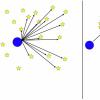Re: Hip’s post #652
“I did not say "recruitment", I said "self selection ... would have to ... recruit". In language, when you have a phrase, the meaning of a phrase depends on all the words within it.”
“Recruit” means to enlist someone for something. “Recruiting” is the participle form of the verb “recruit”. “Recruitment” is a noun meaning the act or process of recruiting--in other words if you “preferentially recruit“ It means you or someone has “enlisted”, or chosen, or made a selection to include someone for “something” in a manner that introduces preference. In this case, the “something” is a study.
Self-selection means that the person himself makes the determination to “enlist” for something. So, if you or someone “preferentially recruit” it means that self selection was not operant. Hence, I wrote (and be sure to pay close attention to the above definitions) “Recruitment isn’t self selection”. It applies to your statement because your hypothetical explanation of how the results might be skewed erroneously, explicitly relies on your proviso that one must “preferentially recruit mask-wearing servicemen”. Get it now?
The pertinent point about self-selection bias is that it does introduce bias into a study that relies on self selection as a means of gaining study participants. The USS Theodore Roosevelt study used self selection. And therefore is, wait for it, garbage.
“Glad to see you taking an interest in the Medical Hypotheses journal.”
Thanks.
It was you, in post #632 who makes an interrogative speculation which is totally lacking in basis:
“So you are not aware that Medical Hypotheses is a controversial journal with suspect editorial policies, no peer review, and is an embarrassment and a problem to its publisher Elsevier? Why don't you read this to put yourself in the picture.”.
And, then, you transmogrify your own words of post #632 into your current confabulation (post #652):
“Earlier you did not seem to know that Medical Hypotheses has somewhat suspect editorial policies.”
I, I ? did not seem to know...?
LOL
“It's possible that Medical Hypotheses may have recently implemented peer review: I just found this 2010 article about the pressure Elsevier is putting on the Medical Hypotheses journal to start performing peer reviews on its submission, rather than editorial reviews.”
You were presented with a fact found in a link (with a copyright of 2021) in which “Medical Hypotheses” asserts that they peer-review, and your response is to say “It's possible that Medical Hypotheses may have recently implemented peer review”. “It’s possible” Oh, is it really? The “when” of “Medical Hypotheses” implementing peer review is immaterial to your original false claim. A factual claim was made by Medical Hypotheses, and it turns out that you made a counterfactual claim in an earlier post without first checking on the current validity of that claim.
I would have thought that you would have had, at least, the presence of mind (well, not really, actually, considering what I have gleaned from your posts thus far) to have checked what turns out to be an erroneous claim before stating it. And then, when you were proven to be wrong, you cite a 14-year-old editorial which, incidentally, also asserts “Editorial review involves selection of a journal’s content primarily by an editor who has broad experience and competence in the field, assisted by a relatively small editorial advisory board.”, in addition to: “the journal deploys a system of editorial review, rather than peer review”. Too bad you aren’t paying attention to the current validity of your “facts” in lieu of spreading misinformation.
“Yes please do. I spend hours here patiently explaining scientific concepts and scientific details, so I think it is only fair that other people make the same efforts.”
Right, and that’s why when I asked earlier for you to enumerate the “corrections” you claimed you had for the author “who is getting paid” who cites Medical Hypotheses article in question as well as study author, there was crickets. To be fair “Daniel Cooper” deleted several posts, and it may be that you hadn’t seen it prior to deletion.
“Yes please do” in the above was In reference to my statement: “You appear to be trying to average particular results of studies which have dissimilar study designs. Would you like me to school you as to why that's a no-no?”
Ok, will do. Would you prefer your schooling to be public, or private? I would suggest you choose public so that interested readers can learn from your mistake, although I suspect most here will already know why what you did, isn’t done (intentionally, that is). Private would avoid you being made a fool of (again), but then, to the contrary, it would lack a general didactical moment that could be enjoyed by many.

































































